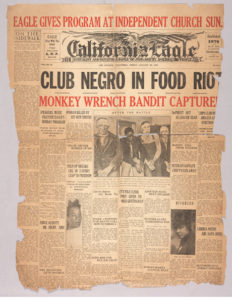
*November 3rd is National Journalism Day, so on this date, we celebrate the first publication of the California Eagle from 1879, one of the oldest Black-owned newspapers in America.
John James Neimore founded the newspaper The Owl that year to serve new arrivals to Los Angeles during the Great Migration when millions of African Americans left the Deep South. The paper offered information on employment and housing opportunities and news stories geared toward the newly arrived migrant population. After Neimore died in 1912, Charlotta Bass bought the paper and renamed it California Eagle. Her husband, J.B. Bass, was editor until he died in 1934
By 1925, the newspaper had a circulation of 60,000, California's largest African American newspaper. Its publishers and editors were active in civil rights, beginning with campaigns for equitable hiring, patronage of black businesses, and an end to segregated facilities and housing. In 1951, Bass retired and sold the California Eagle to the former city editor, Loren Miller. Miller was a law graduate from Washburn University, Kansas. After he relocated to Los Angeles in 1930, he began writing for the Eagle and eventually became the city editor. In 1945, Miller represented Hattie McDaniel and won her case against the "Sugar Hill" restrictive covenant case.
He was appointed in 1963 as a Superior Court of California judge. In 1963, Miller sold the paper to fourteen local investors to accept his appointment as a judge. The California Eagle initially increased circulation from 3,000 to 21,000. However, within six months, the paper had to close; on January 7, 1964, the California Eagle ceased publication after 85 years.